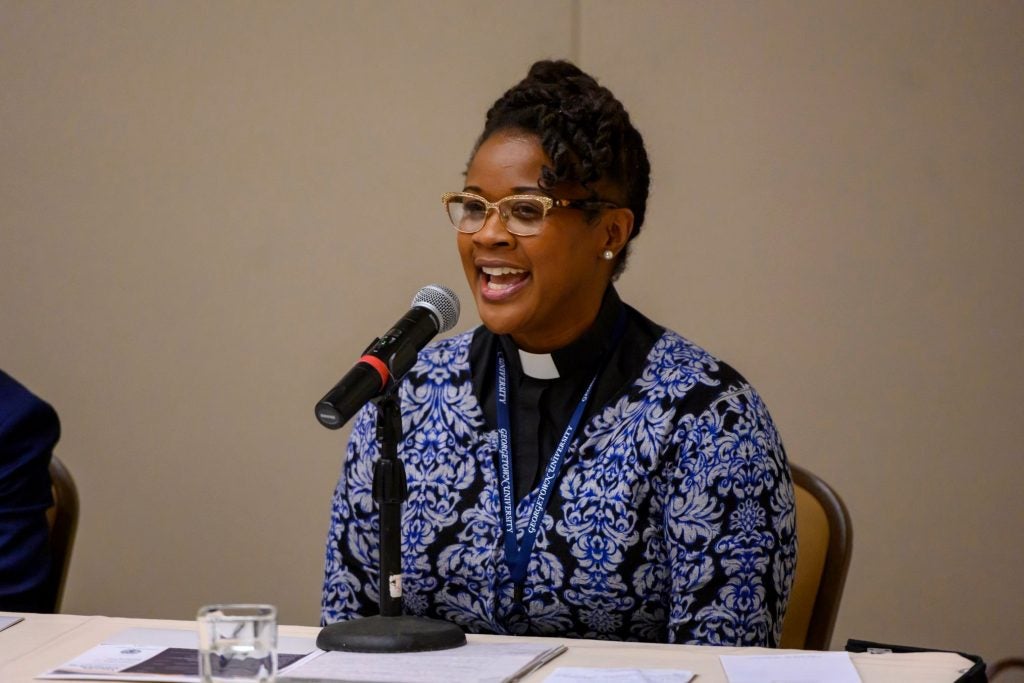Planting Seeds of Meaning, Belonging and Purpose
Recently, The Steve Fund and Georgetown University hosted a conference that focused on the mental health and wellbeing of students of color entitled, Young, Gifted & Advancing: Promoting Mental Health and Well-being among students of color. Protestant Ministry’s Rev. Ebony Grisom (pictured above) participated in the panel, Religion and Spirituality: Meaning, Purpose, and Belonging. Jordan Brown, a member of the Campus Ministry student staff, attended the session and later interviewed Rev. Grisom about her remarks. Their conversation has been edited for length and clarity.
Q: The conference moderator, Dr. Molock, said that faith communities don’t always have a “positive reputation” when it comes to mental health. Do you think this stigma still exists?
A: I like to think there’s been a shift. There’s more conversation now about mental wellness as a part of a holistic framework. I hear less shaming around mental health. I hear folks calling out derogatory terms — not in a mean way, but trying to get people to shift their language. However, attitudes vary by geography, culture, and other social markers.
Many communities are trying to be more inclusive and that’s part of the shift. There’s historic oppression to which the church has contributed, and now they’re moving towards repentance. You can’t say “sorry” and keep doing the same thing; you have to turn away from that harmful behavior. This looks different in various communities based on resources, but it means affirming God’s love for everyone and showing up for affected people.
Q: You mentioned that as a chaplain, you encourage conversation about mental health in spiritual spaces to encourage students to ask for help. What does that look like?
A: Many of the students I speak to struggle with mental health. I’m grateful that students trust me with those conversations. My task is to be present, but also to discern how God is present. It’s about articulating that this doesn’t compromise your worth, especially not in God’s sight.
How do you live with these conditions, and how can the church help and ensure that they remain in the community? How do we help students continue to go to class and cheer for their classmates at basketball games and go to office hours as they find balance with their mental health? We should look to the Bible to know that as you have trials and tribulations, God is still with you.
The more we learn about mental health, the better we are at supporting each other. What would it look like for the church to have conversations about being diligent when it comes to taking care of your mental health? Understand that you’re not doing this by yourself. You have to do the work yourself, but you’re not in the wilderness alone. Faith communities can only take you up to a point; they shouldn’t replace trained mental healthcare providers. I cannot do the work for you, but I will affirm you all along your journey.
Q: You said your role as a chaplain isn’t getting people to change, but rather planting seeds of change. What does that entail?
A: I’m offering a different perspective. It’s not that one person is right and another is wrong; we’re just looking at things from different angles. It would be a shame for a student to come to this tremendous institution and leave believing the same things as when they came in; there are literally people here from all over the world. It’s about synergy: do you take the other person’s perspective and incorporate it into yours? I don’t know what will happen five years from now. It might be that something a student heard as a freshman won’t click until they are 50. I don’t believe God will hold me responsible for the harvest; I’m just here for the planting season. I’m planting seeds of faith, love, hospitality, and truth.
Q: The title of the panel, as well as the motto for the Office of Campus Ministry, is “meaning, belonging, purpose.” What does that phrase mean to you?
A: Meaning is “How do I want my life to define the spaces that I enter?”, and vice versa. How do I make meaning of the things I experience, the people I encounter, of being at Georgetown? Why am I here? Why has God brought me here?
Belonging is a purposeful kind of integration. I belong because God has called me here. What is my responsibility to show up as my full self — not who you think I am, but in my totality? You’re made in God’s image; you belong because you and the earth are the Lord’s.
Purpose is the fulfillment of your mission. There’s something you’re supposed to do, seeds you’re supposed to plant, gifts you’re supposed to share. That’s the reason that you’re called to a place.
by Jordan Brown
Jordan is a junior in the College and a member of the Campus Ministry Communications Team.
